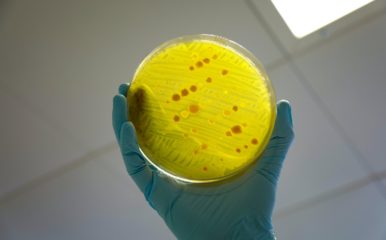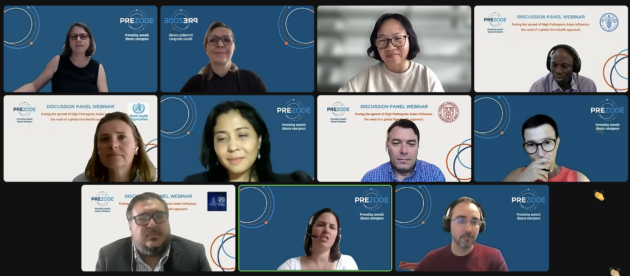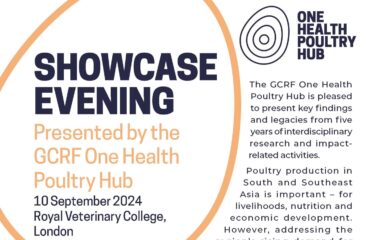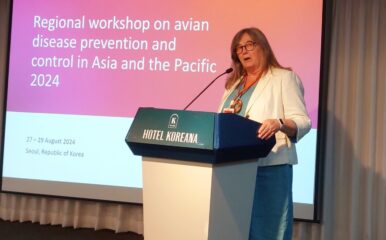
Panel highlights solutions to reduce risks in wake of ‘alarming’ avian influenza spread
Published on 18/06/2024

Dr Nguyen Thi Dien, co-investigator in One Health Poultry Hub, was a panellist in an online discussion on the recent spread of highly pathogenic avian influenza (HPAI) hosted by PREZODE.
The event combined information and analyses regarding the current HPAI situation, which was described as alarming. The panellists discussed how outbreaks and a potential pandemic risk could be better tackled, making recommendations for avian influenza prevention as well as early detection, reporting and response when outbreaks do occur.
The high transmissibility of the HPAI virus and its ability to cross species barriers threaten food safety, food security, and environmental and global health, the panel heard. The economic and social impacts of outbreaks significantly burden farmers and poultry consumers, especially in the poorest communities, and HPAI has an important impact on wildlife populations, causing substantial deaths and disruption of ecosystems.
Dr Folorunso Fasina, early warning and One Health intelligence expert at the Food and Agriculture Organization of the United Nations (FAO), began the discussions by explaining how avian influenza viruses are divided into subtypes and clades. These can evolve rapidly and tend to be highly pathogenic (causing severe disease), as they can exchange genetic material with influenza viruses from other subtypes that infect different species.
Dr Diego Diel, Associate Professor, College of Veterinary Medicine, Cornell University, explained that this ability increases the risk of the virus crossing species . Avian influenza can now jump from one mammal to another, he said.
Detection and preparedness
Dr Aspen Hammond, an influenza surveillance systems expert at the World Health Organization (WHO), highlighted the public health concerns associated with avian influenza. To date, human cases have mostly been linked to close contact with infected birds and contaminated environments. However, though the virus is not yet easily transmitted from person to person, a serious outbreak is certain, he said.
The question is not if it will happen, but where it will happen, Dr Hammond said. All efforts must focus on detection and preparedness.
Studies on food security and food safety show that transmission to humans does not occur through the consumption of well-cooked infected poultry but through the processes before consumption, such as feeding, slaughtering and butchering poultry. These are tasks that often involve women and children in developing countries.
Social and economic impacts
Dr Nguyen Thi Dien, Associate Professor of Sociology at Vietnam National University of Agriculture and a Hub social science co-investigator in the Vietnam team, spoke of the social and economic impacts of HPAI on the value chain: depopulation and loss of livestock and poultry, price distortion, fear of meat consumption, trade restrictions and increased production costs. Fear of stigmatisation can also deter farmers and breeders from reporting risk incidents.
The interconnection between animal, environmental and human activities and health facilitates HPAI outbreaks and spillovers. All the panellists agreed a One Health approach to limit outbreaks and the emergence of new variants was needed and they highlighted solutions to reduce risks (see box below).
For prevention
- Enhance community engagement for early detection and close monitoring.
- Develop comprehensive dialogue and co-create monitoring and reporting
- Establish complementary disease control tools based on sound surveillance and consider local factors such as circulating virus strains and risk assessment.
- Implement movement quarantine
- Reinforce biosecurity measures on farms and poultry value chains to ensure good hygiene practices.
- Organise vaccination campaigns for high-risk and/or endangered animal populations.
For early detection, reporting and response
- Encourage countries to implement control strategies.
- Restore trust in health and political authorities, particularly regarding vaccination campaigns.
- Promote early reporting to reduce the time required to produce effective vaccines.
- Share genetic sequence data of viruses from humans, animals, or their environments in publicly accessible databases quickly, even before peer-reviewed publication.
- Increase collaborative networks, labs, and research across the world, with the FAO and WHO, the Global Influenza Surveillance and Response System (GISRS), the Pandemic Influenza Preparedness Framework (PIP) and OFLU.
PREZODE is a science community which seeks to reach local, national, regional and international decision makers, It plays a role in informing and sharing data to prevent HPAI outbreaks and its primary missions are to encourage exchanges among community members, advance knowledge and practice sharing efforts, offer guidance to policymakers and raise awareness among a broad audience.
The PREZODE panel event was opened by Dr Hinjoy Soawapak, Vice President of the PREZODE General Assembly, and discussions were moderated by Dr Mariette Ducatez, research director at INRAE, and Dr Flavie Goutard, researcher and epidemiologist.


